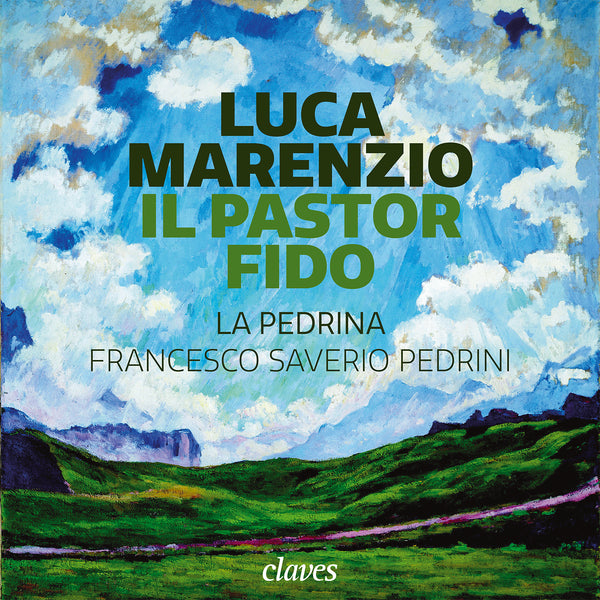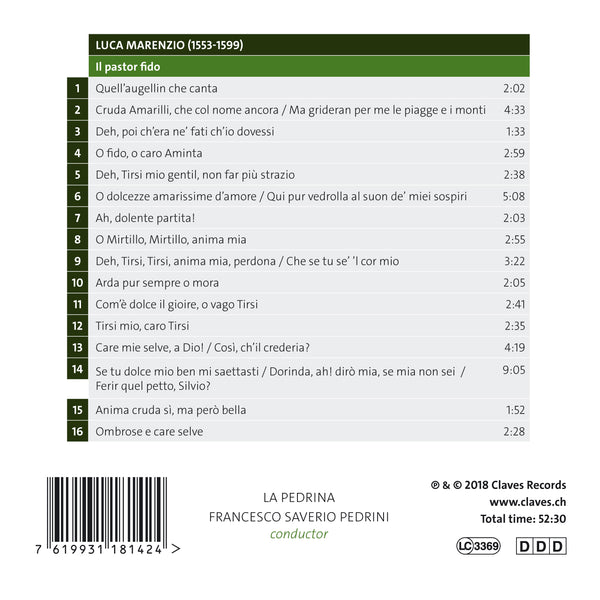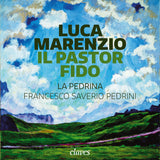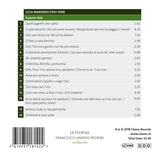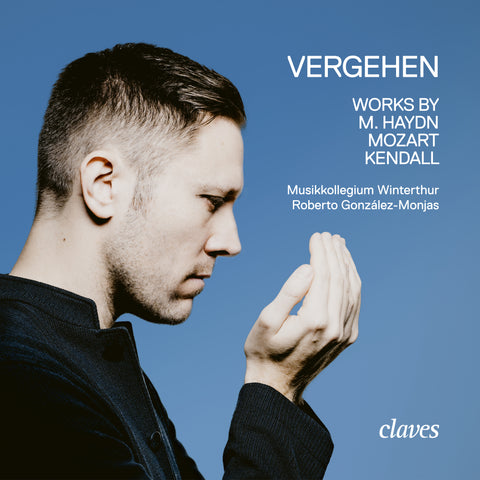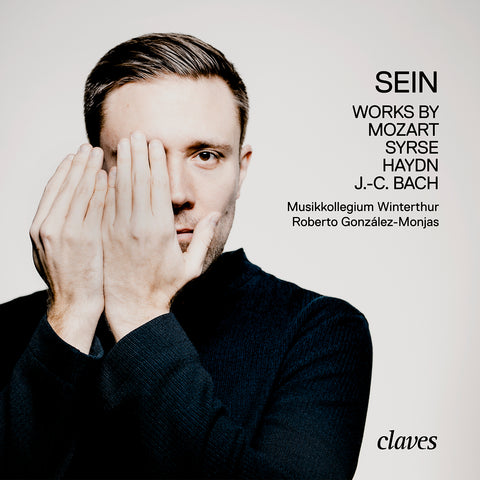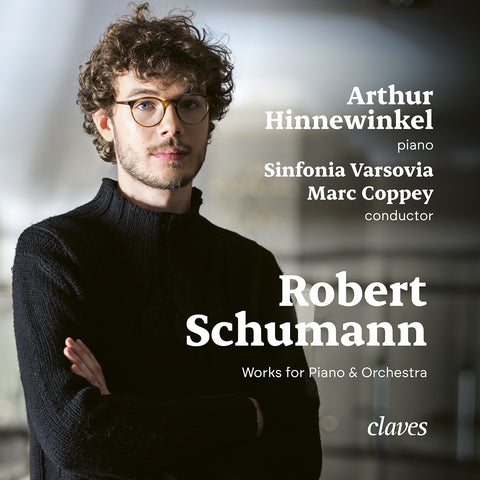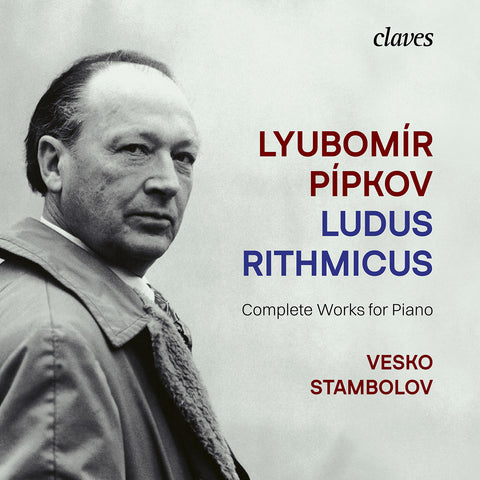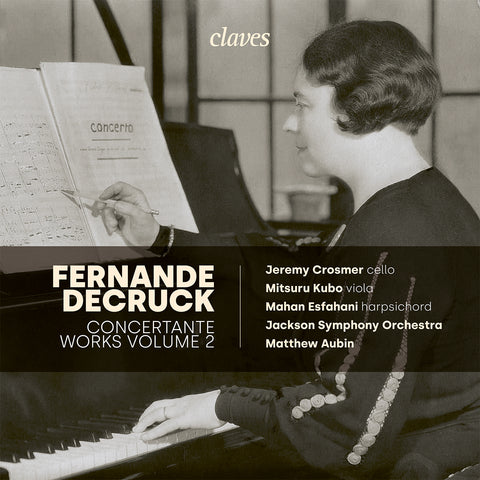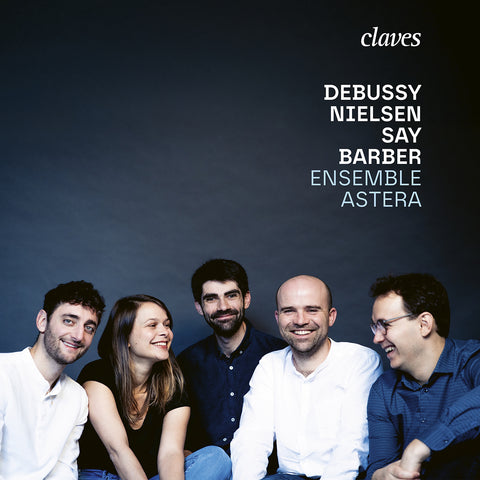(2018) Luca Marenzio: Il pastor fido
Category(ies): Ancient music Oper vocal Rarities
Instrument(s): Harp Harpischord Lute Viola
Vocal(s): Soprano Tenor
Main Composer: Luca Marenzio
Ensemble: Ensemble La Pedrina
Conductor: Francesco Saverio Pedrini
CD set: 1
Catalog N°:
CD 1814
Release: 20.07.2018
EAN/UPC: 7619931181424
This album is now on repressing. Pre-order it at a special price now.
CHF 18.50
This album is no longer available on CD.
This album has not been released yet. Pre-order it from now.
CHF 18.50
This album is no longer available on CD.
CHF 18.50
VAT included for Switzerland & UE
Free shipping
This album is no longer available on CD.
VAT included for Switzerland & UE
Free shipping
This album is now on repressing. Pre-order it at a special price now.
CHF 18.50
This album is no longer available on CD.
This album has not been released yet.
Pre-order it at a special price now.
CHF 18.50
This album is no longer available on CD.
CHF 18.50
This album is no longer available on CD.
LUCA MARENZIO: IL PASTOR FIDO
THE PASTOR FIDO OF BATTISTA GUARINI AND LUCA MARENZIO
Battista Guarini’s Il pastor fido was a real literary sensation, which unleashed one of the last controversies of poetic theory and moral philosophy of the late Renaissance. It may seem strange that a story of pastoral loves set in an exceptionally cultivated Arcadia could cause so much argument and resentment. However, under the pastoral veil, in a feigned age of innocence, the poetry of Guarini reveals a much more complex world (one that becomes complicated beyond measure in the course of over seven thousand lines), painfully passionate, and at the same time extremely sensual. The plot involves two pairs of lovers, Mirtillo and Amarilli on one side, and Silvio and Dorinda on the other, separated by external and internal conflicts, but providentially reunited at the climax of their adventures. The story is not without twists, but according to some of Guarini’s critics, the long text offered nothing more than a predictable collection of love lyrics. Giovan Battista Marino was fond of calling it a “hotchpotch of little madrigals.” Critics also found fault with the structure of the work, with its mixture of tragic and comic elements, and the portrayal of the characters who were raised from humble pastors to the rank of heroes, whose noble affections stood in defense of virtue and faithfulness.
Criticized and admired, Il pastor fido changed the course of European theater. It was much talked about, but few had the opportunity to read it until the end of 1589, when the first edition was published in Venice by Giovan Battista Bonfadino’s printing house. Nobody then had seen it on stage. It was necessary to wait until 1596 for its premiere in Crema during the carnival season, possibly preceded by a performance in Siena in 1593. Even at the court of Mantua, which certainly did not lack cultural and financial resources, a fully staged performance became possible only in 1598. Luca Marenzio (1553/54-1599), one of the most successful composers of those years, published his first madrigals on verses drawn from Il pastor fido in 1594, in the sixth book for five voices, that is to say in a phase of the work’s reception that was still open and uncertain, but full of expectations, and to some extent even experimental, given the various but unsuccessful performance attempts. The following year, Marenzio devoted an almost monographic book to Il pastor fido, the seventh for five voices, which was followed by a long cycle excerpted from the story of Silvio and Dorinda and published in the eighth book of 1598. Marenzio inaugurates, together with Giaches de Wert, the musical fortune of Guarini’s pastoral tragicomedy. In the following years the vicissitudes of the shepherds of his Arcadia dominated the last phase of the polyphonic madrigal, with hundreds of settings, among them some of the most famous and controversial examples of the genre. The present recording collects sixteen of the seventeen Marenzio madrigals on Il pastor fido, not in the order in which they were published, but in the original sequence of events, thus suggesting a path that strives to recompose the musical fragments of Guarini’s drama.
The reasons for Marenzio’s sudden interest in Il pastor fido, a text very few musicians had approached before 1594, have never been fully clarified. It has been suggested that Marenzio may have met Guarini in Rome. A network of patrons associated with the courts of cardinals Cinzio Aldobrandini and Montalto places both, between 1593 and 1595, in an intellectual environment that actively cultivated both literary and musical interests. Montalto himself tried to have Il pastor fido staged in Rome between 1594 and 1596, an attempt that remained, once more, unsuccessful. Leaving aside the possibility of a direct collaboration with the author, it is likely that Marenzio was encouraged by his Roman patrons to work on a musical reading of passages from Guarini’s pastoral drama, perhaps in a general climate of curiosity for a much discussed text whose value had not yet been fully tested in its actual theatrical dimension.
Poised between two seemingly incompatible genres (the individuality of theatrical acting on one side, and the choral rhetoric of the polyphonic madrigal on the other), Marenzio’s music seems to probe the issue of the dramatic intensity of poetry that was originally meant for the stage. There are madrigals, such as “Cruda Amarilli, che col nome ancora” or “Arda pur sempre o mora”, in which the dark images of amorous suffering are transformed into a changing landscape of harsh and unexpected sounds. The dense five-voice polyphony can dissolve words into sounds, entrusting chromatic and dissonant harmony with the task of evoking emotions on a purely acoustic sensory level. But at the same time Marenzio explores and refines new techniques of polyphonic declamation. The result is a supple and passionate choral recitation. This is one of the most original features of his musical approach to Il pastor fido, evident especially in the madrigals from the eighth book. It is a style that has often been described as a form of polyphonic recitative in which a flexible and homorhythmic declamation seems to capture the realism of theatrical declamation without relinquishing the vocal sensuality of polyphony. The performance documented here explores the fascinating ambiguity that characterizes the relationship between spoken word and sung word in these madrigals, alternating solo interpretations with polyphonic realizations. The emotional imitation of single verbal images recedes in favor of a transparent musical intonation of the text. The music celebrates the expressive power of the poetry by transcending the simple reading of a text that seemed impossible to realize on stage. In this sense, Marenzio really offers an example of recitation of Guarini’s theater that manifests itself not in a theatrical representation but in a musical intensification of language.
Giuseppe Gerbino (Department of Music, Columbia University, New York)
LA PEDRINA
The ensemble La Pedrina, founded by Francesco Saverio Pedrini in 2016, derives its name from a sonata by Tarquinio Merula (Canzoni overo Sonate, 1637). The singers and instrumentalists of the ensemble regularly perform in the most renowned groups of ancient music. The repertoire of the ensemble ranges from Italian vocal and instrumental music of the 16th and 17th centuries to the cantatas of J. S. Bach. In 2016 it collaborated with Paolo Pandolfo in the project Regina Bastarda dedicated to the repertoire of diminutions of madrigals and chansons for the viola bastarda. In 2017, on the occasion of the restoration of the “sala delle fatiche d’Ercole” at the Palazzo Venezia in Rome, it produced the performance “Delle battaglie e degli amori d’Ercole” in collaboration with the Renaissance dance company RenaiDanse of Véronique Daniels.
FRANCESCO SAVERIO PEDRINI
Born in Parma in 1973, he graduated in organ and organ composition with Francesco Tasini at the conservatory of his native city. After studying composition in Parma and musicology in Cremona, he specialized in the study of early music at the Schola Cantorum in Basel with A. Marcon and J.-C. Zehnder. The teachings of Michael Radulescu and Luigi Ferdinando Tagliavini also contributed to his training.
He was awarded prizes in the international organ competitions of Bruges and Borca di Cadore. He regularly performs as a continuo player on the organ and harpsichord with Kammerorchester Basel.
In 2006 he founded the Organ Academy of Parma and the International Organ Festival of the City of Parma.
Since 2007 he has been Korrepetitor in the baroque opera class of the Schola Cantorum Basiliensis.
From 2012 to 2016 he was musical director of the Swiss ensemble Voces Suaves with whom he recorded works by Maurizio Cazzati and Giovanni Croce in world premiere.
THE PASTOR FIDO OF BATTISTA GUARINI AND LUCA MARENZIO
Battista Guarini’s Il pastor fido was a real literary sensation, which unleashed one of the last controversies of poetic theory and moral philosophy of the late Renaissance. It may seem strange that a story of pastoral loves set in an exceptionally cultivated Arcadia could cause so much argument and resentment. However, under the pastoral veil, in a feigned age of innocence, the poetry of Guarini reveals a much more complex world (one that becomes complicated beyond measure in the course of over seven thousand lines), painfully passionate, and at the same time extremely sensual. The plot involves two pairs of lovers, Mirtillo and Amarilli on one side, and Silvio and Dorinda on the other, separated by external and internal conflicts, but providentially reunited at the climax of their adventures. The story is not without twists, but according to some of Guarini’s critics, the long text offered nothing more than a predictable collection of love lyrics. Giovan Battista Marino was fond of calling it a “hotchpotch of little madrigals.” Critics also found fault with the structure of the work, with its mixture of tragic and comic elements, and the portrayal of the characters who were raised from humble pastors to the rank of heroes, whose noble affections stood in defense of virtue and faithfulness.
Criticized and admired, Il pastor fido changed the course of European theater. It was much talked about, but few had the opportunity to read it until the end of 1589, when the first edition was published in Venice by Giovan Battista Bonfadino’s printing house. Nobody then had seen it on stage. It was necessary to wait until 1596 for its premiere in Crema during the carnival season, possibly preceded by a performance in Siena in 1593. Even at the court of Mantua, which certainly did not lack cultural and financial resources, a fully staged performance became possible only in 1598. Luca Marenzio (1553/54-1599), one of the most successful composers of those years, published his first madrigals on verses drawn from Il pastor fido in 1594, in the sixth book for five voices, that is to say in a phase of the work’s reception that was still open and uncertain, but full of expectations, and to some extent even experimental, given the various but unsuccessful performance attempts. The following year, Marenzio devoted an almost monographic book to Il pastor fido, the seventh for five voices, which was followed by a long cycle excerpted from the story of Silvio and Dorinda and published in the eighth book of 1598. Marenzio inaugurates, together with Giaches de Wert, the musical fortune of Guarini’s pastoral tragicomedy. In the following years the vicissitudes of the shepherds of his Arcadia dominated the last phase of the polyphonic madrigal, with hundreds of settings, among them some of the most famous and controversial examples of the genre. The present recording collects sixteen of the seventeen Marenzio madrigals on Il pastor fido, not in the order in which they were published, but in the original sequence of events, thus suggesting a path that strives to recompose the musical fragments of Guarini’s drama.
The reasons for Marenzio’s sudden interest in Il pastor fido, a text very few musicians had approached before 1594, have never been fully clarified. It has been suggested that Marenzio may have met Guarini in Rome. A network of patrons associated with the courts of cardinals Cinzio Aldobrandini and Montalto places both, between 1593 and 1595, in an intellectual environment that actively cultivated both literary and musical interests. Montalto himself tried to have Il pastor fido staged in Rome between 1594 and 1596, an attempt that remained, once more, unsuccessful. Leaving aside the possibility of a direct collaboration with the author, it is likely that Marenzio was encouraged by his Roman patrons to work on a musical reading of passages from Guarini’s pastoral drama, perhaps in a general climate of curiosity for a much discussed text whose value had not yet been fully tested in its actual theatrical dimension.
Poised between two seemingly incompatible genres (the individuality of theatrical acting on one side, and the choral rhetoric of the polyphonic madrigal on the other), Marenzio’s music seems to probe the issue of the dramatic intensity of poetry that was originally meant for the stage. There are madrigals, such as “Cruda Amarilli, che col nome ancora” or “Arda pur sempre o mora”, in which the dark images of amorous suffering are transformed into a changing landscape of harsh and unexpected sounds. The dense five-voice polyphony can dissolve words into sounds, entrusting chromatic and dissonant harmony with the task of evoking emotions on a purely acoustic sensory level. But at the same time Marenzio explores and refines new techniques of polyphonic declamation. The result is a supple and passionate choral recitation. This is one of the most original features of his musical approach to Il pastor fido, evident especially in the madrigals from the eighth book. It is a style that has often been described as a form of polyphonic recitative in which a flexible and homorhythmic declamation seems to capture the realism of theatrical declamation without relinquishing the vocal sensuality of polyphony. The performance documented here explores the fascinating ambiguity that characterizes the relationship between spoken word and sung word in these madrigals, alternating solo interpretations with polyphonic realizations. The emotional imitation of single verbal images recedes in favor of a transparent musical intonation of the text. The music celebrates the expressive power of the poetry by transcending the simple reading of a text that seemed impossible to realize on stage. In this sense, Marenzio really offers an example of recitation of Guarini’s theater that manifests itself not in a theatrical representation but in a musical intensification of language.
Giuseppe Gerbino (Department of Music, Columbia University, New York)
LA PEDRINA
The ensemble La Pedrina, founded by Francesco Saverio Pedrini in 2016, derives its name from a sonata by Tarquinio Merula (Canzoni overo Sonate, 1637). The singers and instrumentalists of the ensemble regularly perform in the most renowned groups of ancient music. The repertoire of the ensemble ranges from Italian vocal and instrumental music of the 16th and 17th centuries to the cantatas of J. S. Bach. In 2016 it collaborated with Paolo Pandolfo in the project Regina Bastarda dedicated to the repertoire of diminutions of madrigals and chansons for the viola bastarda. In 2017, on the occasion of the restoration of the “sala delle fatiche d’Ercole” at the Palazzo Venezia in Rome, it produced the performance “Delle battaglie e degli amori d’Ercole” in collaboration with the Renaissance dance company RenaiDanse of Véronique Daniels.
FRANCESCO SAVERIO PEDRINI
Born in Parma in 1973, he graduated in organ and organ composition with Francesco Tasini at the conservatory of his native city. After studying composition in Parma and musicology in Cremona, he specialized in the study of early music at the Schola Cantorum in Basel with A. Marcon and J.-C. Zehnder. The teachings of Michael Radulescu and Luigi Ferdinando Tagliavini also contributed to his training.
He was awarded prizes in the international organ competitions of Bruges and Borca di Cadore. He regularly performs as a continuo player on the organ and harpsichord with Kammerorchester Basel.
In 2006 he founded the Organ Academy of Parma and the International Organ Festival of the City of Parma.
Since 2007 he has been Korrepetitor in the baroque opera class of the Schola Cantorum Basiliensis.
From 2012 to 2016 he was musical director of the Swiss ensemble Voces Suaves with whom he recorded works by Maurizio Cazzati and Giovanni Croce in world premiere.
www.francescosaveriopedrini.com
Return to the album | Read the booklet | Composer(s): Luca Marenzio | Main Artist: Francesco Saverio Pedrini






